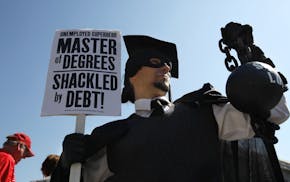Corporate tax cut fever is in the air.
In the last couple of weeks, Minnesota legislators have introduced bills that would reduce the state's corporate tax rate, which is among the highest in the nation, while eliminating a variety of tax credits.
On the presidential campaign trail, Democrats and Republicans alike have called for cuts in the federal corporate tax rate of 35 percent. It's a timely and important discussion, even if the plans they're promoting lack substantive details or are tailored more to electoral ambitions than economic or fiscal reality.
For instance, Rick Santorum, the Republican presidential candidate facing tough primary battles in manufacturing-heavy Michigan and Ohio, recently proposed cutting manufacturers' corporate tax rate all the way to zero. President Obama, needing to win those states in November, would tax manufacturers at 25 percent and all other companies at 28 percent.
Manufacturing's comeback may be one of the feel-good stories of the U.S. economic recovery, but rewarding goods-producers with a sweetheart tax rate would only perpetuate the inefficiencies and inequities of the current corporate tax code.
"Obama and Santorum are using the words 'tax reform' and saying a lot of the right things," said noted tax expert and author Martin Sullivan. "But when you simultaneously propose new tax breaks for manufacturing and alternative energy, it doesn't give you much credibility in the tax reform debate."
Sullivan is an economist who writes regularly for Tax Analysts, a Virginia-based nonprofit publisher that is a go-to source for news and analysis of tax issues. He has served on the staffs of the Treasury Department and the Joint Committee on Taxation, but you don't have to be a tax wonk to understand or enjoy his most recent book, "Corporate Tax Reform: Taxing profits in the 21st century."
Sullivan goes after some tax breaks that businesses love, such as the one that allows them to deduct interest payments on their debt, which he says encourages companies to borrow too much.
He also makes a clear and persuasive case for why cutting tax rates would boost corporate profits, employment and economic growth -- even if he's skeptical that rate cuts will occur anytime soon.
How low should they be?
"I was asked that question last year, when I testified before the House Ways and Means Committee," he said by phone Thursday. "I said zero percent, and I stand by that."
Sullivan's stance is more mainstream than wingnut, at least among economists. Dividends -- the share of profits that companies pay out to shareholders -- are already taxed at the individual level, so the corporate tax is a second bite of the same apple. Reducing or eliminating the corporate tax would give businesses more incentive to invest in research and development, equipment and jobs.
Sullivan is a realist, though. He knows the corporate tax rate will never be zero because Americans, out of a sense of fairness and financial need, would never allow it. The U.S. imposed a corporate tax three years before passing a constitutional amendment that allowed it to collect an individual income tax. The corporate tax is politically the safest and most popular route for the government to raise money.
But it's becoming an increasingly ineffective, unreliable and inequitable source of revenue. Companies and industries have won exemptions and loopholes that allow them to pay much lower rates. Large, privately owned businesses, like Menards, can use an ownership structure that allows them to avoid the corporate tax altogether. As a result, it falls disproportionately on the largest publicly owned companies -- the kind you or I might own through our 401(k).
The disparity between tax rates in the United States and elsewhere also encourages companies to move production, profits and jobs abroad. Come April 1, the United States will claim the dubious distinction of having the highest corporate tax rate among the world's developed economies.
Taxes aren't the only factors companies consider when making location decisions, but in a global economy a country can't afford to be known as the most expensive landlord.
In China, the corporate tax rate is 25 percent. Canada's is 27.2 percent but heading to 25 percent later this year, and Germany comes in at 30.2 percent. The average rate for all 33 countries that make up the Organization for Economic Cooperation and Development is 25 percent. In Ireland, a popular destination for Minnesota companies, it's 12.5 percent.
The U.S. rate may never get that low, but Sullivan thinks a realistic goal should be 28 percent. That would equate to a permanent increase in after-tax profits of 10 percent.
"It doesn't have to happen all at once," Sullivan said. "Even if you went from 35 to 33 to 31, those would be major accomplishments."
But it couldn't happen unless also accompanied by eliminating most of the credits, loopholes and exemptions littered throughout our corporate tax code.
And that's where the dream of tax reform will probably die. Companies may want low rates, but they don't want to give up their sweetheart deals.
"The public will be deluged with messages informing them that the tax breaks in question are essential to keeping jobs in America," Sullivan said.
Even if they might be doing just the opposite.
ericw@startribune.com • 612-673-1736

Wieffering: Time to get over debit card fees
For Thrivent and others, warnings were there

With billions in sales, some co-ops are big business

